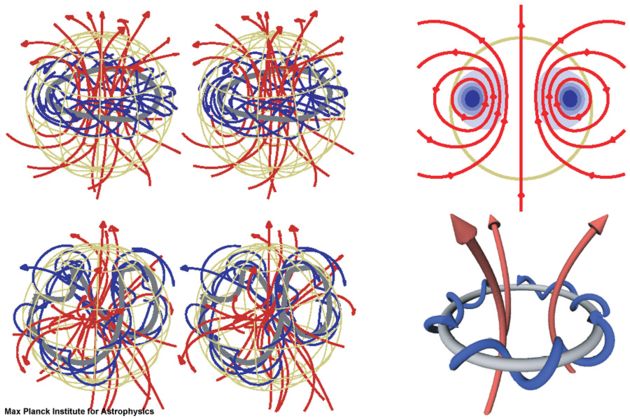Mystery of Magnetic Stars Solved

While you may never have pondered the similarity between a common bar magnet and a star, astronomers do, and they believe they have figure out why the two disparate bodies are sometimes strikingly similar.
Magnetic activity on many stars, such as our Sun, varies a lot over days, weeks and years. Magnetic fields pop in and out of existence at different spots and overall intensity changes with time. But other stars have strong, consistent magnetic fields that behave just like the smooth and static field of a bar magnet. Astronomers call them magnetic stars.
In these magnetic stars, as with bar magnets, magnetic field lines emanate from each pole, north and south, and loop outward like the skeletal lines of a perfect pumpkin, connecting one pole to the other.
There are three types of magnetic stars:
- Magnetic A-stars are otherwise normal and about two to 10 times as hefty as the Sun. One example is Alioth, the third star in on the handle of the Big Dipper.
- Some white dwarfs, which are burnt-out stellar corpses, have magnetic fields 100,000 times stronger than the typical magnetic A-star.
- Magnetars are ultra-dense neutron stars that have fields 100 billion times stronger than a commercial bar magnet.
- Key Found to Why Sun's Magnetic Poles Flip
Get the Space.com Newsletter
Breaking space news, the latest updates on rocket launches, skywatching events and more!
Join our Space Forums to keep talking space on the latest missions, night sky and more! And if you have a news tip, correction or comment, let us know at: community@space.com.

Rob has been producing internet content since the mid-1990s. He was a writer, editor and Director of Site Operations at Space.com starting in 1999. He served as Managing Editor of LiveScience since its launch in 2004. He then oversaw news operations for the Space.com's then-parent company TechMediaNetwork's growing suite of technology, science and business news sites. Prior to joining the company, Rob was an editor at The Star-Ledger in New Jersey. He has a journalism degree from Humboldt State University in California, is an author and also writes for Medium.









